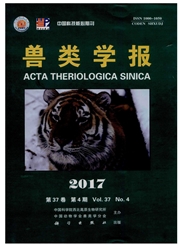

 中文摘要:
中文摘要:
禁食导致一些啮齿动物的贮食量增加,但禁食处理后雄性长爪沙鼠贮食行为的变化则不一致。每天禁食22h,长爪沙鼠的一些个体表现出高水平的贮食行为(禁食贮食组),而另一些个体则没有表现出贮食行为(禁食无贮食组)。延长禁食(22h)持续的时间(连续重复3d和20d)和增加禁食时间(禁食48h),都没有使禁食无贮食组的动物表现出贮食行为。同样在自由取食条件下,长爪沙鼠的贮食行为也表现为二型性。在自由取食和禁食条件下,贮食量与体重、体脂含量和瘦素的浓度之间无明显相关关系。研究结果表明,禁食是诱导雄性长爪沙鼠贮食行为发生的一个重要条件,但增加禁食的程度并不改变其贮食行为的表现。
 英文摘要:
英文摘要:
Compensatory increases in food hoarding are commonly observed after a period of food deprivation in some spe- cies, including laboratory rats and Siberian hamsters. However, faced with food deprivation, the changes of food hoarding are different in male Mongolian gerbils (Meriones unguiculatus). In the study, gerbils were undergoing food deprivation for daily 22 hours consecutive 3 days or 20 days, or 48 hours fast and measured food hoarding. After they were sacrificed and body fat and serum leptin were measured. For example, daily food deprivation for 22 hours could induce food hoarding in some, but not all, gerbils that normally did not display food hoarding. However, increases in energy challenge ( repeated 3 days or 20 days food deprivation, or 48 hours fast) didn' t induce food hoarding in gerbils that didn' t display food hoard- ing under food deprivation condition. Further, male Mongolian gerbils also exhibited a bimodal expression of food hoarding with free access to food. We did not detect relationships between food hoarding and body weight, body fat, or serum leptin levels. Combined these data suggest that food deprivation is an important factor to induce food hoarding, but food hoarding is not influenced by increases in food deprivation in male Mongolian gerbils.
 同期刊论文项目
同期刊论文项目
 同项目期刊论文
同项目期刊论文
 Partial removal of brown adipose tissue enhances humoral immunity in warm-acclimated Mongolian gerbi
Partial removal of brown adipose tissue enhances humoral immunity in warm-acclimated Mongolian gerbi Increased Feeding and Food Hoarding following Food Deprivation Are Associated with Activation of Dop
Increased Feeding and Food Hoarding following Food Deprivation Are Associated with Activation of Dop Limits to sustained energy intake. XIX. A test of the heat dissipation limitation hypothesis in Mong
Limits to sustained energy intake. XIX. A test of the heat dissipation limitation hypothesis in Mong 期刊信息
期刊信息
